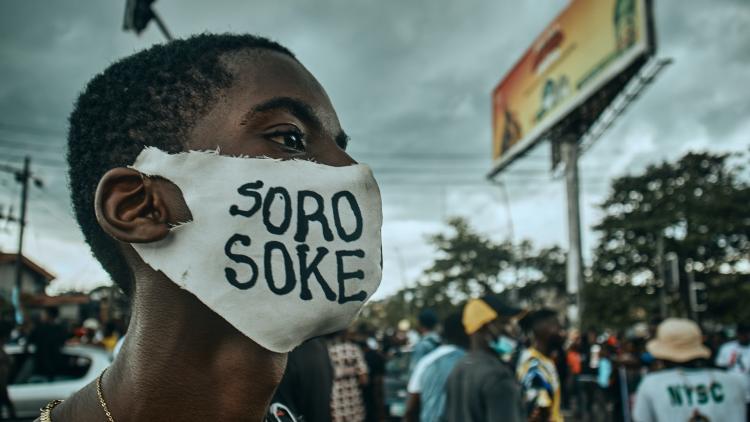Law and the Atlantic Slave Trade, Slavery, and Post-Slavery

Key information
- Start date
- End date
- Year of study
- Final Year
- Duration
- Term 2
- Module code
- 155200097
- FHEQ Level
- 6
- Credits
- 15
- Department
- School of Law, Gender and Media
Module overview
“Modern life begins with slavery ... You can call it an ideology and an economy, what it is is a pathology. Slavery broke the world in half, it broke it in every way. It broke Europe. It made them into something else, it made them slave masters, it made them crazy. You can't do that for hundreds of years and it not take a toll. They had to dehumanize, not just the slaves but themselves. …Racism is the word that we use to encompass all this.”
- Toni Morrison
The Atlantic slave trade and the slavery of the New World were integral to the modern world economy. Their relationship to capitalism was historical and organic rather than adventitious or synthetic.”
- Cedric Robinson
The SOAS Law curriculum has understandably privileged the African and Asian colonial and post-colonial world and has comparatively neglected the Atlantic slave trade and slavery (and the correlative historical significance of the New World African diaspora), although they have long been regarded as co-eval and co-equal and co-constitutive in relation to Western modernity.
This module is intended to redress that lacuna and afford students the opportunity to explore and understand the multiple dimensions, dynamics and consequences of the long arc from the slave trade through slavery to post-slavery as fundamentally determined, conditioned, enabled, and regulated by law.
If slavery was essential to the emergence of our shared contemporary planetary existence, law has been essential to slavery, its institution, and its abolition, and to its post-abolition revenant presence and abiding influence. Further, just as no adequate understanding of colonialism, anti-colonial struggles, or the course of post-colonial history in Continental Africa is possible without appreciation of the legacy of slavery and the complex reciprocal post-slavery dynamics between African societies and African diasporas, and between them and the Euro-Atlantic metropoles, so too does an understanding of the relation of law to both African and European history, political economy and society more generally require particular appreciation of the centrality and ubiquity of law over half a millennium in the abduction, forced Atlantic displacement and enslavement of millions of African women, men, and children; and thereupon the forced labour in commodity production, protracted emancipation, and grudging incorporation in post-slavery societies on terms of racialised social, political and economic subordination, of their descendants.
Note: This module is available to third year LLB, LLB with Year Abroad, and BA Law and... [second subject] students. For Senior Status LLB students, this module is available in the second year.
Objectives and learning outcomes
On successful completion of this module, a student will be able to:
- Demonstrate a sound understanding of the legal determinants, concomitants, and consequences of the Atlantic slave trade and New World slavery
- Understand the implication of law in the construction of race and racial categories and the development/deployment of racialised commerce and racialised rule
- Gain a foundational knowledge of the economic, political and social contexts of the slave trade, slavery and post-slavery and the significance and role of law for each
- Critically appraise the role of law in enabling, conditioning, authorising, regulating and abolishing the slave trade and slavery and in conditioning and shaping Black and white collectivities and subjectivities across slavery and post-slavery societies
Workload
- Weekly 2-hour lecture
- Weekly 1-hour tutorial
Scope and syllabus
1. Concept and Context: Classical slavery. Medieval European slavery. Islamic slavery. Continental African slavery. Atlantic chattel slavery. Modern slavery. Comparative legal basis and framework of institution. Transhistorical/transcultural (in)coherence. Categorical novelty of chattel (commodity) slavery.
2. The Slave Trade I: Coastal Slave Trading 15th- 19th century: Forms of authority, European and African, metropolitan, and peripheral, sovereign and commercial (public and private). Territory and property. Transactions and negotiations: buyers, sellers, brokers. Racial and mixed-race roles and status. Person and non-person commodities. Capital. West/Central African Coastal European settlement, fortification, governance (regulation) and penetration. Punishment and capture as rationale for enslavement. Slave traffic to coast. Barracoons.
3. The Slave Trade II: Middle Passage: Slave vessel. Shipboard authority, terror and violence. Maritime law (navigation, insurance, prize, anti-piracy, naval). Comparative imperial regulation (Portugal, Spain, Netherlands, Great Britain). Asientos. Royal Africa Company. Monopoly v competition. Compliant v unauthorised trading. Jurisprudence. Merchant/Shipowner/Captain/Crew/Trader contractual chain. Liability, obligation, enforcement. Triangular trade. Regulation of Liverpool, Bristol, London & Colonial Caribbean/North American slaveports. East India and European trade goods and African demand.
4. The Slave Trade III: Abolition (slave trade then slavery): Public/civil and parliamentary theatres. Freed people. Slave narratives. Colonialism/imperialism as complement and supplement to slavery. International law and hegemonic humanitarianism (global policing). ST abolition as human rights law avant le lettre.
5. Plantation Slavery I: Sugar: the Caribbean (Barbados, Jamaica, St Domingue, Cuba) and Brazil: Spatial and temporal organisation of labour & nature. Plantation governance/governmentality (quasi-executive, legislative, judicial authority of plantocracy). Early (17th-18thc) Slave Codes (Barbados). Code Noir. Racial capitalism. Native genocide/marginalisation. Agro-industrial production regime. Commodity chain.
6. Plantation Slavery II: Cotton: US slave states: Constitutional and legislative regulation. Jurisprudence Dred Scott). Federal and sectional relations/tension. Slaveholding and privatised enforcement/protection. Late (19thc) Slave Codes (Alabama). Ante-bellum plantation regime. Slave status/capacity. Abolitionism. Underground railroad. Manchester & Mississippi (Southern feudal agrarianism essential to Northern/European industrialisation). Wartime emancipation and military service (US Coloured Troops). Freedpeople’s land tenure (40 acres and a mule).
7. Slave Agency: politics, expression and thought: Resistance and flight (marronage and rebellions), Subversion and adaptation. Education/literacy. Religion. Music. Literature. Enlightenment/Rights discourse. Slaves/Freedpeople in abolition debates. Equiano and Douglass. Revolutionary agency (US, France, St Domingue). Slave/Black sovereignty (Louverture, Dessalines). ‘Colonisation,’ Liberia and Sierra Leone.
8. Post-slavery: Terror and subordination. Resistance and assertion. Black Codes. Reconstruction. Jim Crow & political/civil disenfranchisement. Sharecropping and post-slavery labour regimes. Carceral labour (chain gangs, prison farms). Private and public violence/terror (lynchings, riots, police repression). Black vocational/higher/professional education. Great Migration. Ghettoisation. Educational/employment/housing discrimination. Black trade unionism (BSCP). Black business. Civil rights and anti-colonial struggles. Affirmative action. ‘Riots’/Rebellions. Black Power. BLM. Post-slavery and post-coloniality. Reparations. Caribbean, Cuban, and Brazilian parallels.
9. Blackness and Whiteness: Collectivity and subjectivity. Legal construction of race. Social death. Wages of whiteness. Race and/as property. Critical Race Theory. Pan-societal racialisation. Neutrality/’colour-blindness’. Equality/hierarchy. Anti-Blackness and Antisemitism. Biological racism/Eugenics. Slavery, Colonial violence, Holocaust. Language/naming (‘Negro’/’N-word’). Caricature (minstrelsy/blackface). Black Atlantic and post-slavery culture. Literary/musical/artistic forms. Black Radical tradition. Pan-Africanism and diasporic solidarity/differentiation. Repatriation, Ethiopianism, Black nationalism. White nationalism/supremacism/Fascism.
10. Gender and Sexuality: across the slave trade, slavery and post-slavery: Gender and gender-variance in the slave trade and in slavery. Enslaved women and families. Family law and enslaved children/spouses/Separation; Slave/master sexual/power dynamics and regulation. Gender, sexuality and family in post-slavery. Gendered effects of racial subordination/marginalisation. Feminism. Masculinity/Patriarchy. Intersectionality.
Method of assessment
- Written 3-hour exam paper (50% total mark)
- Assignment of max. 3000 words (50% total mark)
Suggested reading
- Hugh Thomas, The Atlantic Slave Trade
- Cedric Robinson, Black Marxism
- Marcus Rediker, The Slave Ship.
- Eric Williams, Capitalism and Slavery
- Sven Beckert, The Empire of Cotton
- CLR James, The Black Jacobins
- Orlando Patterson, Slavery and Social Death
- W E B Dubois, Black Reconstruction in America
- Mark M. Smith and Robert L. Paquette, The Oxford Handbook of Slavery in the Americas
- Anna Julia Cooper, Slavery and the French and Haitian Revolutions
- Elizabeth Hinton, America on Fire: The Untold History of Police Violence and Black Rebellion Since the 1960s
Disclaimer
Important notice regarding changes to programmes and modules.



